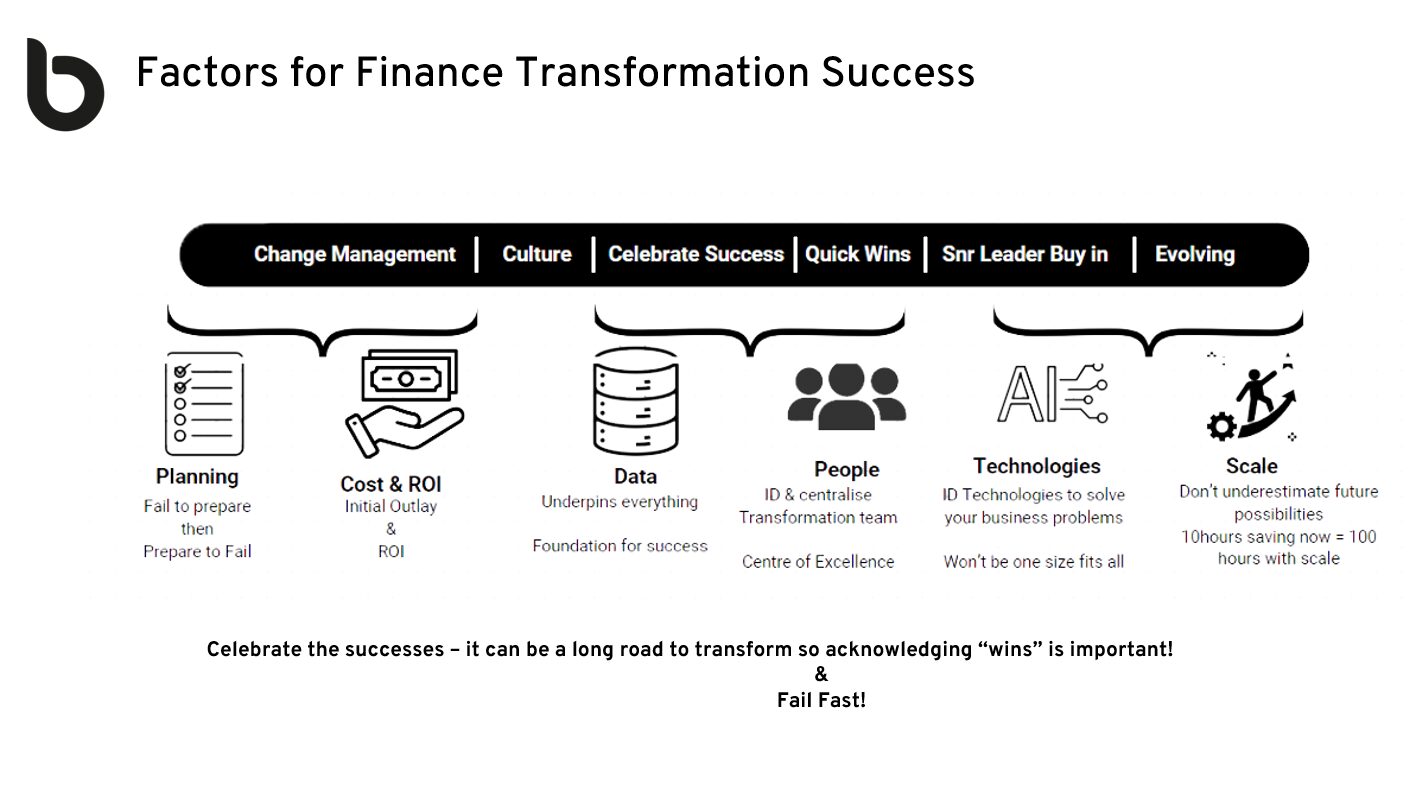Embarking on a finance transformation journey is no small feat. Organisations must focus on several critical factors that will guide the transformation process to ensure a successful outcome. When strategically managed, these factors can contribute to achieving a more agile, efficient, and scalable finance function. In this article, I share key elements that have contributed to the success of transformation initiatives throughout my experience, highlighting their importance in driving sustained change.
Factors for Finance Transformation Success
As with any transformation programme there will always be critical success factors at play that will contribute to successful outcomes. In my experience some factors to consider include:

Leadership – They set the vision and agenda for transformation, create an environment of accountability and make decisions for the good of the organisation as a whole.
Governance: Strong governance is essential for the success of any transformation programme, as it ensures clear accountability, effective decision-making, and alignment between all stakeholders, helping to mitigate risks and keep the programme on track towards achieving its strategic goals.
People / Resources – Identify and centralise the transformation team to ensure they can work standalone on the transformation programme.
Implementation Partner – Dependent on the scale of the project, you may need to engage with an implementation partner. The key to success in selecting is to ensure they are compatible culturally with your organisation and will partner with each function to achieve success.
Identify Technologies – Identifying what technologies will provide the solution to meet the transformation objective is critical for success. Examples include Robotic Process Automation (RPA), Business Intelligence (BI), data science & analytical tools (i.e. Alteryx) & Enterprise Resource Planning (ERP). Often, it’s not a “one size fits all” and a hybrid of solutions may be required to achieve optimisation.
Scalability – When adopting automation, consider its scalability. What starts as a small automation solution can scale to deliver significant time and cost savings as the business grows. The ability to scale existing solutions is key to ensuring long-term sustainability of your transformation initiatives.
Quick Wins – It ia important to secure quick wins early in the transformation journey. These victories, though small, build momentum and demonstrate the tangible benefits of transformation, keeping stakeholders engaged and motivated throughout the process.
Change Management – A fundamental element to ensure success of any transformation. It will go on long after implementation has occurred and should align to a culture & ethos of continuous improvement. It should not be an afterthought, it should form a key element of the transformation programme from planning to implementation.
Constantly Evolving – Transformation is constantly evolving, it should not pause or end. You need to consider new ways of adapting and automating as business strategy and external factors change. This lends itself to setting up a centre of excellence, further details below.
Return on Investment (ROI) – Consider ROI but don’t allow this to be the primary driver in decision making during transformation. You need to consider other factors in conjunction with ROI. Measure value as you go because transformation is iterative. Think of factors such as employee engagement, attracting talented employees to best-in-class finance functions, customer engagement and ability to respond to customer demands and external environment factors.
Sustainability Considerations – This is a hot topic at the moment and will continue to be so. Ensure it is part of the planning process around your transformation objectives and vision, both for finance and the wider organisation.
Centre of Excellence – When established, consider creating a centre of excellence to manage the transformation journey allowing other areas of the business to leverage off automation opportunities.
And finally celebrate the successes!! The journey to transformation can take time, so celebrating each milestone is important to keep momentum & engagement across the organisation.
Key Takeaway
The success of a finance transformation initiative hinges on several critical factors. From leadership and resources to selecting the right technologies and fostering a culture of continuous improvement, organisations must carefully manage each of these elements. By considering scalability, quick wins, change management, and sustainability, businesses can set themselves up for long-term success. The most successful transformations view change as a continuous journey, embracing new opportunities and celebrating progress along the way.
Take a look at the two previous blogs in this series…
Navigating Finance Transformation With AI…Factors For Success – Barden
Variables Impacting Transformation – Barden
A little bit more about Catherine…
Catherine is a Consultant with Barden’s Technology Practice. In her role Catherine supports Barden on a variety of different initiatives playing a key role in supporting clients within the project/change space.
Contact Catherine at catherine.drysdale@barden.ie or via LinkedIn.


 Jump Back
Jump Back

